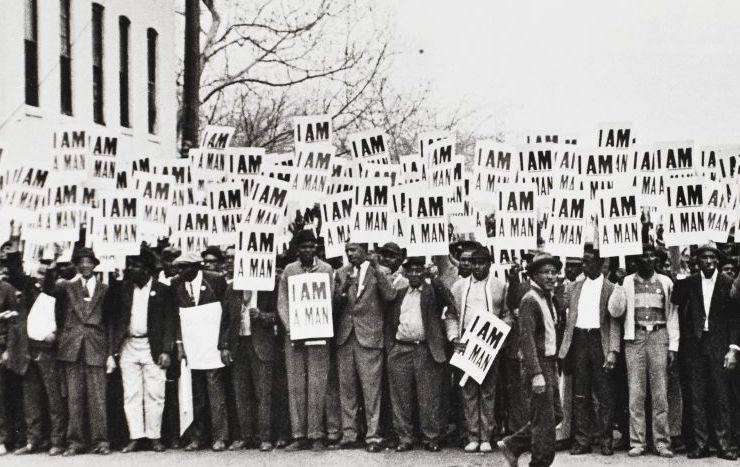In today’s news and commentary, unions, workers, and entrepreneurs announce strategies for working with and under the Trump administration, unionized Costco workers authorize a nationwide strike, and Cornell’s Industrial and Labor Relations School finds a rare transcript showcasing Dr. Martin Luther King’s early commitment to the labor movement.
As President Donald Trump takes office today, unions, workers, and entrepreneurs strategize their paths forward. A majority of America’s unions endorsed Vice President Kamala Harris for President and now must navigate a potentially hostile political landscape. The United Auto Workers’ outspoken President, Shawn Fain, announced his intention to work with any administration that prioritizes fixing America’s trade deals and combatting corporate greed. Fain wrote an op-ed in The Washington Post yesterday highlighting the Union’s interest in addressing failed trade policies and rebuilding American manufacturing. The piece did not shy away from calling out the areas of President Trump’s agenda with which the Union disagrees, but committed to working with the incoming administration to find common ground and advance the interests of the working class. Fain was clear that the UAW must be at the table as the Trump administration negotiates new trade and tariff agreements and develops policies concerning American manufacturing and its workers.
Additionally, with today’s administration change, the future of the FTC’s ongoing noncompete ban is uncertain. The FTC is currently defending its rule banning noncompete agreements in the Fifth and Eleventh Circuits. Republican appointees to the agency have openly opposed the ban, arguing that its promulgation was beyond the FTC’s authority. An entrepreneurs group, the Small Business Majority, has filed motions to intervene in both appellate courts in the event that the Republican-run FTC chooses to abandon its defense of the rule. Small Business Majority says it will “continue the fight in place of the FTC on behalf of entrepreneurs everywhere who simply want an opportunity to pursue their dreams of small business ownership but have been prohibited from doing so because of unfair, unenforceable and unnecessary noncompete agreements.” According to Small Business Majority’s research, over one-third of small businesses could not hire someone because of a noncompete and nearly a half could not start or grow a business because of a noncompete. The group only intends to intervene when the government stops defending the rule in whole or in part.
Costco Teamsters voted overwhelmingly to authorize a strike. The Union, which represents over 18,000 Costco employees nationwide, is negotiating a successor contract to the Costco Teamsters National Master Agreement which expires on January 31. In a press release issued today, the Union announced that the vote was a “direct result of the company’s continued failure to bargain constructively and [its] refusal to present a fair contract that reflects the company’s record-breaking profits.” Eighty-five percent of members approved the strike which would take place at 56 Costco stores across 5 states. Unionized Costco employees make up just 8% of Costco’s total US employee base. The Union claims the company has rejected proposals concerning seniority pay, paid family leave, bereavement and sick time policies, and safeguards against surveillance. The final week of negotiations begins today.
Today, on Martin Luther King Jr. Day, we are reminded of Dr. King’s early and steadfast commitment to the working class and the labor movement. Cornell’s Industrial and Labor Relations School recently discovered a rare transcript of one of Dr. King’s earliest speeches, given at a meatpacking union conference in Chicago in 1957, just a few years after gaining national prominence. In it, King said: “I still believe that organized labor can be one of the most powerful instruments to do away with this evil that confronts our nation that we refer to as segregation and discrimination.” King saw the civil rights movement and the labor movement as intertwined and worked to advance the cause of both until his assassination, which took place as he was in Memphis supporting sanitation workers’ strike.







Daily News & Commentary
Start your day with our roundup of the latest labor developments. See all
July 4
The DOL scraps a Biden-era proposed rule to end subminimum wages for disabled workers; millions will lose access to Medicaid and SNAP due to new proof of work requirements; and states step up in the noncompete policy space.
July 3
California compromises with unions on housing; 11th Circuit rules against transgender teacher; Harvard removes hundreds from grad student union.
July 2
Block, Nanda, and Nayak argue that the NLRA is under attack, harming democracy; the EEOC files a motion to dismiss a lawsuit brought by former EEOC Commissioner Jocelyn Samuels; and SEIU Local 1000 strikes an agreement with the State of California to delay the state's return-to-office executive order for state workers.
July 1
In today’s news and commentary, the Department of Labor proposes to roll back minimum wage and overtime protections for home care workers, a federal judge dismissed a lawsuit by public defenders over a union’s Gaza statements, and Philadelphia’s largest municipal union is on strike for first time in nearly 40 years. On Monday, the U.S. […]
June 30
Antidiscrimination scholars question McDonnell Douglas, George Washington University Hospital bargained in bad faith, and NY regulators defend LPA dispensary law.
June 29
In today’s news and commentary, Trump v. CASA restricts nationwide injunctions, a preliminary injunction continues to stop DOL from shutting down Job Corps, and the minimum wage is set to rise in multiple cities and states. On Friday, the Supreme Court held in Trump v. CASA that universal injunctions “likely exceed the equitable authority that […]